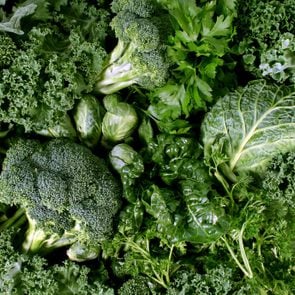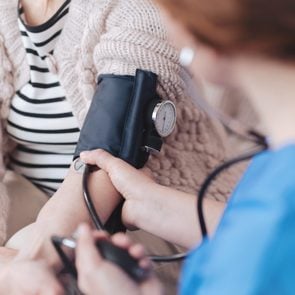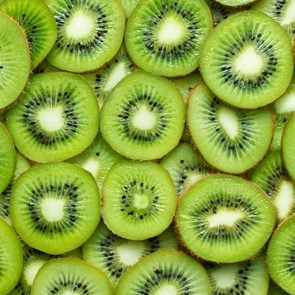If You Don’t Eat a Banana Every Day, This Might Convince You to Start
Updated: Jan. 27, 2024
An apple a day keeps the doctor away? Not so much. Try this fruit, instead.

You know a banana is a great topping for oatmeal, a convenient snack for travel and the key ingredient in a tasty bread. But you might not realize that bananas are one of the healthiest fruits you can eat. If this yellow fruit is your favorite, you and your heart are in luck. One of the key nutrients in bananas, potassium, is essential for a healthy heart.
Eating More of This Can Improve Your Gut Health, Says New Science
Potassium has heart health benefits
Past research has found that a potassium-rich diet helps lower blood pressure and reduce the risk of heart disease, according to Ragavendra Baliga, MD, a cardiologist at the Ohio State University Wexner Medical Center. “One analysis published in the Journal of American College of Cardiology included data from 11 studies and 250,000 people,” Dr. Baliga says. “This study reported that an average increase of 1540 mg of dietary potassium per day is linked to a 21% reduced risk of stroke.”
Getting enough potassium helps maintain a healthy heartbeat, according to Michelle Routhenstein, RD, a preventive cardiology dietitian. “When potassium is deficient, low levels can cause heart arrhythmias and potentially impair blood flow to the brain, muscles and organs,” she says. Potassium also helps you digest carbohydrates and build muscle. The combination of these perks could do wonders for your arteries, preventing heart disease and strokes down the road.
Eating This Nut May Reduce Heart Disease Risk, New Study Says
Potassium might promote healthier arteries
In a 2017 study in the Journal of Clinical Investigation, a research team led by Yong Sun of the University of Alabama looked at mice that are genetically prone to develop cardiovascular disease. The researchers fed the mice a diet containing either low, normal or high levels of potassium.
Overall, the mice given a low-potassium diet had more hardening of the arteries and accumulation of calcium deposits (calcium is a component of heart disease-related fatty plaques) than mice given high levels of potassium.
20 Foods That Can Help Prevent Clogged Arteries
Bananas aren’t the only way to eat potassium
The results of the study are promising, according to registered dietitian Ali Webster, PhD, the associate director at the International Food Information Council. However, researchers need to replicate this in people to draw a definitive conclusion. “It certainly won’t hurt to eat potassium-rich foods every day, unless you’ve been instructed to watch your intake,” Webster says. “But we can’t say that one specific food is going to prevent cardiovascular disease.” You need to consider the whole diet as well as other risk factors, too, Routhenstein adds.
That said, the DASH diet, which is designed to help lower blood pressure, is rich in potassium because it counteracts the effects of sodium in the diet. Lower blood pressure generally translates into a lower risk of heart disease. (The DASH diet, for Dietary Approaches to Stop Hypertension, is promoted by the American Heart Association and the National Heart, Lung, and Blood Institute, and was ranked one of the best diets in 2020 by the US News and World Report.)
The Best and Worst Diets for Your Cholesterol, Says UCLA Cardiologist
For most people, eating potassium-rich foods like bananas, sweet potatoes, beans, and dark leafy greens will contribute to a healthy diet and possibly reduce the risk for cardiovascular disease, according to Webster. Many people in the United States consume less potassium than is recommended, and the Dietary Guidelines for Americans named potassium a “nutrient of public health concern.” Most adults should aim to get 2,600 to 3,400 mg of potassium daily. One medium banana has 422 mg of potassium, so they are an excellent source of the mineral.
While bananas do have a reputation for containing lots of potassium, other foods contain it too. Dr. Baliga also recommends broccoli, spinach, carrots, cauliflower, and other vegetables to his patients. For example, one medium baked potato with skin contains 941 mg of potassium.
So don’t worry if you hate the yellow fruit, there are still plenty of ways to eat a good amount of potassium.




















